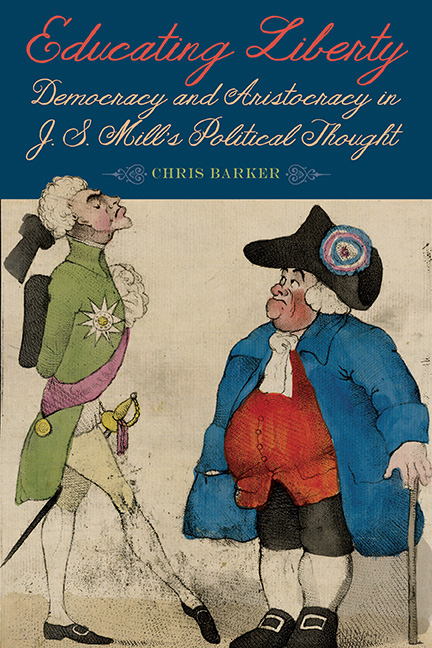1 - The Aristocracy of Sex
Published online by Cambridge University Press: 24 July 2019
Summary
What sort of education does a society need in the area of relations between men and women? One might argue, as Tocqueville does in describing the American household, that democracy's liberty is predicated on the traditional household. For women, this involves a dark compromise: the freedom of American society is advanced by relying on women to live cramped and other-directed lives, in spite of the fact that women's liberty is enlivened by educations that permit them to see beyond the artificial and perhaps unnecessary walls of nineteenth-century society.
For Mill, women's education as presently constituted is an example of a performative contradiction in plain sight, where the “masters of women” turn the “whole force of education” toward rendering women submissive. Mill's own solution is legalistic and, on the surface, conservative. Change the laws of marriage, he proposes, and you change the relations between men and women, and between a woman and her children, and perhaps (this is discussed at length below) the relation between women and their work. For this contribution, Mill is said to be the founder of first-wave feminism. But Mill's claim that he only seeks to deal with the juridical problem of gender inequality under law is intentionally misleading. Buried under the topsoil of his narrow concern about the legal status of women are a number of concerns about identity formation that make up the bedrock of second- and third-wave feminism. The reader does not have to dig too far to find them, and the radical education that Mill promotes in texts such as The Subjection of Women forms a crucial part of his broader theory of educated liberty.
Custom, or the degree of Mill's contempt for the traditionally constituted household, presents the key question here. Just how much of a threat to a just and well-constituted liberal regime is the power of the male head of household, and how much must the traditional patterns of hierarchy in the household change to liberalize civic education? In the interpretation offered below, Mill does not argue for (or against) radical changes in the composition of the nuclear family or for a wholesale rejection of the traditional household. Instead, he argues for changes in the arbitrary patterns of authority that prevail in the household.
- Type
- Chapter
- Information
- Educating LibertyDemocracy and Aristocracy in J. S. Mill's Political Thought, pp. 16 - 49Publisher: Boydell & BrewerPrint publication year: 2018



